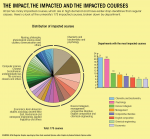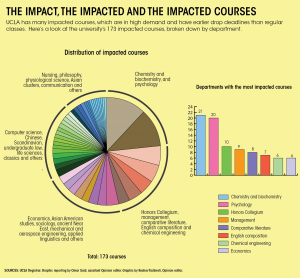Time to map out your class schedule, watch the number of spots left in each course plummet with every page refresh and ultimately rearrange your academic plan while hoping you don’t have to reinvent your career.
Every midquarter enrollment pass feels like a midlife crisis.
Impacted class designations are given out by the Faculty Executive Committee, an elected group of faculty members that serves as an advisory and governing body within the College of Letters and Science. It considers a few main criteria: a class’ enrollment demand, its instructor-to-student ratio and its required resources. Most laboratory or Writing II requirement courses also qualify as impacted.
UCLA has 173 impacted classes. These can fill up quickly, which means they’re nearly impossible for some students to take.
The departments with the most impacted courses are the chemistry and biochemistry department and the psychology department, which already have prerequisites with overwhelming demand.
Students must take impacted courses within a certain window of time to declare their majors and take higher-level courses. But even if they’re doing everything right, the limited amount of space in these popular courses can mean they either have to spend extra quarters on campus or abandon their majors altogether.
Enrollment at the nation’s No. 1 public university is clearly broken. And UCLA is fine with that.
It feels ridiculous that for many, the hardest part of pursuing a major is simply getting a seat. It’s even more concerning that few administrators have any idea how to address this.
Before declaring a major, a student must first work their way through long a list of impacted prerequisite classes. For example, pre-psychology students must take Psychology 100B before the fall of their third year to declare the psychology major, but must take Statistics 10, Psychology 10 and Psychology 100A before they can do so. And although Psychology 100B is in extremely high demand, only one lecture has been offered each quarter for the past year.
Melina Solomon-Dorian, the undergraduate advising supervisor for the psychology department, said in an email statement the number of courses offered and the size of courses is determined not only by curricular need, but also by limitations, such as classroom space, instructor and teaching assistant availability and workload guidelines set by the TA union.
“The (psychology department) houses some of the most popular majors on campus, and although the student population is growing rapidly, resources are not growing at the same rate,” she said. “In light of this, the department faculty and staff continually reassess needs and have modified course sizes over the years to ensure timely graduation of our students.”
For many students, this has not been enough.
Bridgett Kiernan, a second-year pre-psychology student, has been unable to enroll in Psychology 100B for the past two quarters since the course and its waitlist have filled up long before her first enrollment pass.
“In order to declare my major, all I have left to do is take this one class,” Kiernan said. “I’m trying everything I can to do that, and I keep getting told (by the department) I can’t.”
These delays can jeopardize students’ college careers.
Manuela Guyot, a second-year microbiology, immunology and molecular genetics student, says she’s struggled to get into many of the core classes she needs as a pre-med student.
“It’s super frustrating because we all have to take (a) physics series, but the lectures have super limited spots, so we often can’t start our series on time,” Guyot said. “I already can’t go abroad and have to take classes every summer because I couldn’t get a spot in the Physics 5 series.”
Students like Guyot are thrust into situations where they have to bend over backward – whether that’s paying summer tuition, overloading themselves with five classes per quarter or petitioning to graduate at a later time.
And these Bruins aren’t getting much help. Kiernan said she emailed the psychology department to get a petition to enroll in Psychology 100B, but got an email advising her to attend drop-in counseling hours and reconsider her eligibility for the psychology major.
“I came into college knowing I wanted to do psychology, and UCLA accepted me as a pre-psychology major. It’s what I’m passionate about, and I’m scared I can’t do it at all now,” she said. “How can I be told that I might not be eligible to be a pre-psychology or psychology student when (UCLA) accepted me into this school as one?”
The university has options for solving this issue. It could expand lecture halls so classes can physically hold more students. It could hire more professors and TAs to offer more lectures. And yet, we’ve seen few of these kinds of developments.
Certainly, UCLA students signed up to attend a campus where resources are thinly spread across a large population. But the university makes a guarantee to students when it admits them: You can come here, get a top-notch education and walk out with a reputable degree in the major you applied to.
That’s a promise we hardly see today.
Bruins come to Westwood to pursue their passions because UCLA told them they could. What none of us signed up for, though, is a midquarter crisis every four months.

